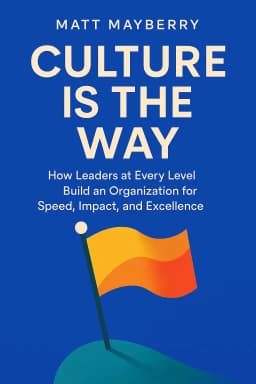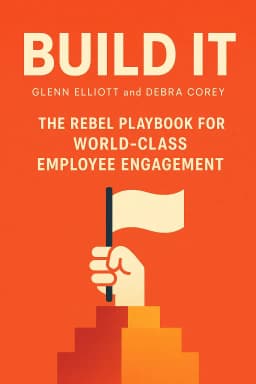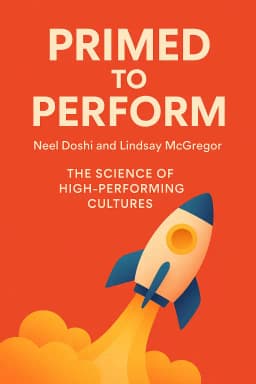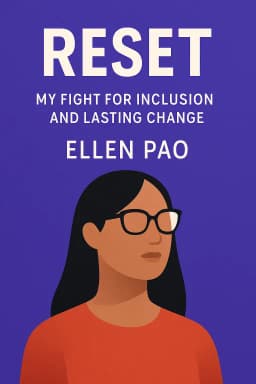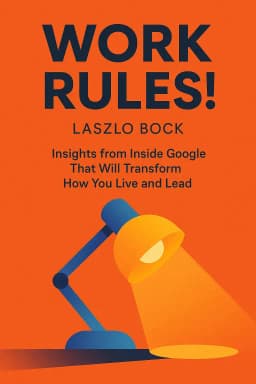
Google's Talent Machine
Golden Hook & Introduction
SECTION
Michelle: What’s the most important decision a manager makes? Mark: Hiring someone, I guess? It sets the stage for everything else. Michelle: Right. And what if I told you that for most managers, their typical interview process is about as effective at predicting success as flipping a coin? Mark: That’s… terrifying. And having been through a few of those interviews, I can say it feels painfully true. It feels like you’re just trying to vibe with the person across the table. Michelle: It's exactly that terrifying reality that Laszlo Bock tackles in his book, Work Rules!: Insights from Inside Google That Will Transform How You Live and Lead. Bock was the head of People Operations at Google, and he was obsessed with using data to dismantle these kinds of broken, gut-feeling-based corporate traditions. Mark: Right, he was the guy who basically reinvented HR for the tech world. I've heard the book is highly-rated but also a bit controversial because people question if these 'rules' can really work outside the Google bubble, with its endless resources. Michelle: Exactly. And that's what we're going to dig into today. He argues they can, and it starts with a radical idea about freedom. He was motivated to write this after seeing so many companies stick to these old, low-freedom, command-and-control models, even when all the research showed they were less effective. Mark: It’s easier, I suppose. Less thinking involved for managers. Michelle: Precisely. But Bock wanted to show there's a better way. And it begins not with strategy or perks, but with culture.
The High-Freedom Workplace: Why Culture Eats Strategy for Breakfast
SECTION
Michelle: When you hear the term "corporate culture," Mark, what comes to mind? Mark: Honestly? Beanbag chairs, a ping-pong table in the corner, and maybe a "Pizza Friday." It usually feels like a superficial layer painted over the same old corporate structure. Michelle: That’s the common view, and it’s what Bock argues is a complete misunderstanding of what culture actually is. At Google, he says, culture isn't an artifact; it's the operating system. It’s built on three cornerstones: a mission that matters, radical transparency, and a genuine employee voice. Mark: Okay, "mission that matters" sounds like something every company puts on a poster. How is it different at Google? Michelle: The difference is in how it’s used. Google’s mission is "to organize the world’s information and make it universally accessible and useful." It's not about market share or profit. It’s a moral, not a business, goal. This attracts a certain kind of person and, more importantly, it becomes the ultimate tie-breaker in tough decisions. Mark: That sounds good in theory, but does it hold up when billions of dollars are on the line? Michelle: That’s the perfect question. And the ultimate test case was Google's decision in China. In 2006, to operate in China, Google agreed to censor its search results, which directly contradicted its mission. Internally, this created a huge rift. Googlers were deeply uncomfortable with it. Mark: I can imagine. You can't be for "universally accessible information" while actively blocking it. Michelle: Exactly. The tension simmered for years. Then, in 2010, after a major cyberattack originating from China targeted the Gmail accounts of human rights activists, the debate exploded. It wasn't just an executive decision. It was an all-hands, company-wide crisis of conscience. Sergey Brin, whose family had fled the Soviet Union, was personally against censorship. But the business case for staying in China was enormous. Mark: So what happened? Michelle: This is where culture trumped strategy. The decision-making process was incredibly transparent. There were heated debates, emails flying everywhere. Employees had a real voice, and they used it to hold the company accountable to its mission. In the end, Google announced it would stop censoring search results on google.cn and effectively walk away from the mainland Chinese search market. They chose their mission over massive profits. Mark: Wow. So the employees, not just the executives, really drove that decision? That's wild. It shows the culture isn't just a slogan; it's a set of rules the company actually has to live by. Michelle: It's the ultimate proof. But that level of employee voice is only possible because of the second pillar: transparency. By default, everything at Google is open. Product roadmaps, team goals, even notes from executive meetings are accessible to almost everyone. Mark: Hold on, isn't that incredibly risky? What about leaks? What about confidential information? Most companies operate on a need-to-know basis. Michelle: Google’s philosophy is the opposite. They default to open, believing that if you treat people like owners, they will act like owners. They trust that employees are good and will do the right thing. Of course, there are exceptions for sensitive personal or financial data, but the starting assumption is to share. This openness fosters trust and allows someone in, say, advertising in Dublin to see what an engineering team in California is working on and offer a brilliant suggestion. It prevents silos and accelerates innovation. Mark: That makes sense. When you’re kept in the dark, you can’t connect the dots. But you need the right people for that to work. People who won’t abuse that trust. Michelle: You’ve hit on the critical point. Having that kind of high-freedom culture is entirely dependent on who you let in the door. Which brings us right back to that coin-flip interview problem.
The Talent Machine: Deconstructing the Myth of 'Gut-Feeling' Hiring
SECTION
Mark: Okay, so if the typical interview is so bad, what's the alternative? How did Google fix it? Michelle: They approached it like an engineering problem: with data, experimentation, and a refusal to trust human intuition. Bock is ruthless about this. He cites a landmark 1998 study by Frank Schmidt and John Hunter that analyzed 85 years of hiring data. It found that a typical, unstructured interview only explains about 14% of a new hire's performance. Mark: Only 14 percent! That’s abysmal. What works better? Michelle: Two things, mainly. First, work sample tests, where you have a candidate do a small piece of the actual job. For an engineer, that means writing code. For a writer, it means writing something. This explains about 29% of performance—twice as good. The second is a structured interview. Mark: What exactly is a structured interview? How is it different from a normal one? Michelle: It means every candidate for a given role is asked the same set of questions, and their answers are graded against a consistent, pre-defined rubric. This removes the "vibe check" and forces the interviewer to assess specific skills and attributes. The questions are also behavioral—"Give me an example of a time you dealt with a difficult teammate"—rather than hypothetical brainteasers. Mark: Ah, the dreaded brainteasers. "How many golf balls fit in a 747?" Michelle: Utterly useless! Bock says all they do is make the interviewer feel smart. Google famously banned them after their own data showed zero correlation between being good at brainteasers and job performance. They even ran a hiring experiment with a cryptic billboard puzzle on a highway. It got them a ton of press, but zero hires. They learned that being a lone genius puzzle-solver doesn't mean you'll be a good team member. Mark: That’s a fascinating failure. So, Google combines work samples and structured interviews. Is that the whole secret? Michelle: That's the foundation, but the system is what makes it a 'talent machine.' First, managers do not make the hiring decision for their own team. Mark: Wait, what? Why not? They’re the ones who have to work with the person. Michelle: Because managers get desperate. When a role has been open for months, they're more likely to lower their standards just to fill the seat. Instead, at Google, the decision is made by a committee of peers and leaders who are objective and only care about maintaining the quality bar. The hiring manager has a voice, but not the final say. Mark: That’s a brilliant check and balance. It takes the emotion and bias out of it. Michelle: It does. And they assess every candidate on four specific attributes: General Cognitive Ability—not IQ, but the ability to learn and adapt; Leadership—specifically emergent leadership, the tendency to step up when needed; "Googleyness"—a fuzzy mix of humility, conscientiousness, and intellectual curiosity; and finally, Role-Related Knowledge. They found that for most roles, the first three are far more important than the last one. They’d rather hire a brilliant, learning athlete than someone who just knows one thing perfectly. Mark: This sounds incredibly rigorous. It reminds me of that "acqui-hiring" trend from a few years back, where companies like Yahoo would buy whole startups just to get the engineers. This feels like a much more sustainable way to build a team. Michelle: It's the difference between buying talent and cultivating it. Acqui-hiring is expensive and often fails because the culture doesn't stick. Google's approach is designed to be a self-replicating system. They believe hiring is the single most important people activity, so they invest more time and energy there than anywhere else. Mark: Okay, so you've built this incredible machine to hire the best people and put them in this high-freedom culture. But what happens when some of them inevitably struggle? Or when some are just so much better than everyone else? How do you manage that without destroying morale? Michelle: That leads us to some of Bock's most controversial, and perhaps most brilliant, ideas about performance and pay.
Nudging Towards Greatness & Paying Unfairly
SECTION
Mark: I'm ready. Hit me with the controversial stuff. How do you handle the people who aren't cutting it? Michelle: Most companies do one of two things: they ignore the problem, which is a slow and cruel failure, or they have a harsh "up or out" system where you fire the bottom 10% every year. Google does neither. They focus on what they call "The Two Tails" of the performance curve. Mark: The best and the worst performers. Michelle: Exactly. They believe the biggest opportunity for improvement lies with the bottom 5%. But instead of firing them, they tell them, "You are in the bottom 5 percent. I know that doesn't feel good. The reason I'm telling you this is that I want to help you grow and get better." It's a message of compassionate pragmatism. They then invest heavily in coaching and training to help that person improve or find a role where they can succeed. Mark: That’s a huge departure from the Jack Welch-style stack-ranking that was so popular. It sounds much more humane. But what about the other tail? The superstars? Michelle: That’s where it gets really interesting. They study their top performers relentlessly to figure out what makes them successful at Google. For example, they launched Project Oxygen to figure out if managers even mattered. The engineers thought they were a waste of time. But the data proved that good managers made a huge difference. So they identified the eight behaviors of the best managers and turned it into a checklist to train all the others. Mark: A checklist for being a good manager? That sounds almost too simple. Michelle: But it works! They use data to create "nudges." For instance, after identifying the key behaviors, they created a simple survey where employees could give their managers anonymous feedback. The worst managers improved their scores by almost 10% in two years. It’s about making improvement measurable and easy. But the most controversial part is how they reward those top performers. Mark: Let me guess. This is the "pay unfairly" part. That just sounds like a recipe for a toxic, competitive workplace. How is that fair? Michelle: Bock argues that our definition of fairness is wrong. We tend to think fairness means everyone in the same role gets paid roughly the same. But human performance doesn't follow a normal bell curve; it follows a power-law distribution. Research shows that in many fields, the top 1% of workers produce ten times more than the average worker. The top 5% produce four times as much. Mark: So you're saying it's actually unfair to pay a superstar the same as an average performer, because their contribution is exponentially greater? Michelle: Precisely. So at Google, it's possible for two people with the same job title to have vastly different salaries and bonuses. One person might get a $10,000 bonus, and another might get $1,000,000. It’s not about the title; it’s about the impact. Mark: My head is spinning. How do you prevent jealousy and infighting? That seems like the biggest risk. Michelle: Through two things we've already talked about: transparency and process. The criteria for performance are well-defined and public. And the decisions about pay and promotion are made by committees, not individual managers, which removes bias and favoritism. But they also learned a crucial lesson from a program called the Founders' Awards. Mark: What was that? Michelle: It was a program that gave huge stock awards to teams for extraordinary accomplishments. But it backfired. It became demoralizing because most people felt they could never win. And even the winners would argue over who deserved more. The lesson was powerful: celebrating money is a bad idea. It makes people feel transactional. So they shifted to the principle of "Celebrate Accomplishment, Not Compensation." Instead of just cash, they give experiential rewards—a team trip, a unique gift. The joy of money is fleeting, but the memory of a shared experience lasts. Mark: That’s a profound insight. It’s not about the dollar amount, but the recognition and the shared sense of achievement. Michelle: Exactly. It all ties back together. You can only pay unfairly if you hire fairly. You can only have a high-freedom culture if you trust the people you've hired. It’s not a collection of perks; it’s a deeply interconnected system.
Synthesis & Takeaways
SECTION
Mark: So, when you strip it all away, it’s not really about the free food or the on-site doctors. It’s a system built on a few core principles: give people freedom, hire people who are better than you, and then trust them enough to get out of their way. Michelle: That's the heart of it. It’s about systematically engineering a culture that treats people like founders, not cogs in a machine. And while many of the book's critics are right that not every company can afford Google's perks, Bock's central argument is that the most important principles are actually free. Mark: What do you mean, free? Michelle: Trust is free. Transparency is free. Giving your team a voice is free. And the most powerful takeaway for anyone listening, whether you're a CEO or an individual contributor, is to act like a founder of your own team's culture. Mark: I like that. You don't need a huge budget to start making things better. Michelle: Not at all. Bock says you don't need permission to start building a better culture. So maybe the one actionable step for everyone listening is to go to your team tomorrow and ask a simple question: "What's one thing we could do, starting this week, to make our work more meaningful?" The answer might surprise you. Mark: A powerful and simple place to start. It’s about taking ownership, no matter your role. Michelle: This is Aibrary, signing off.
